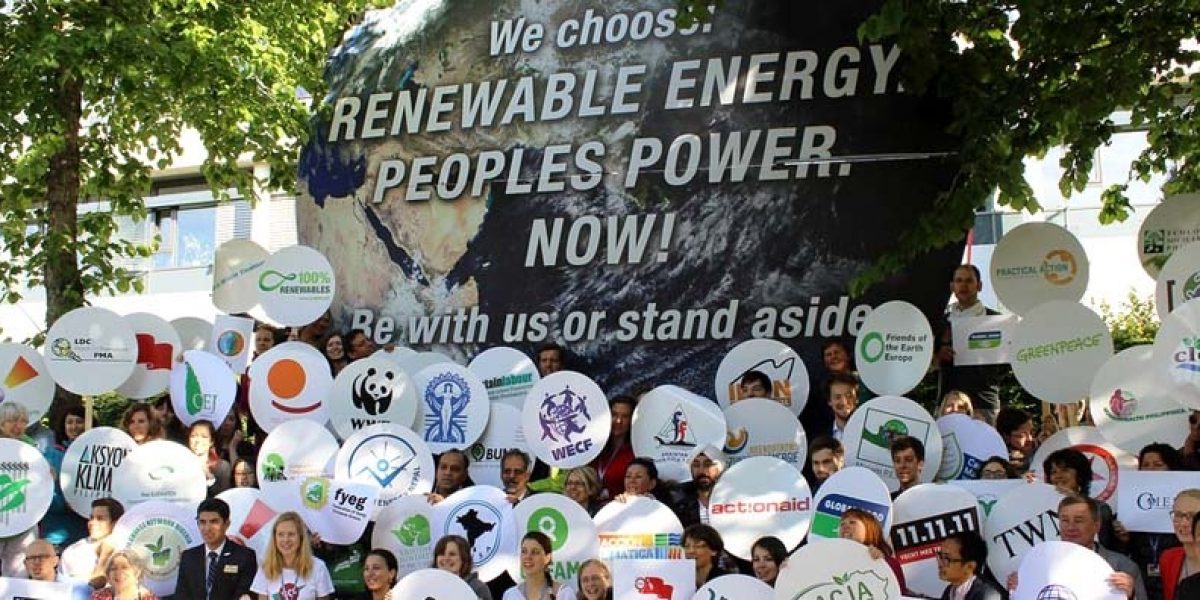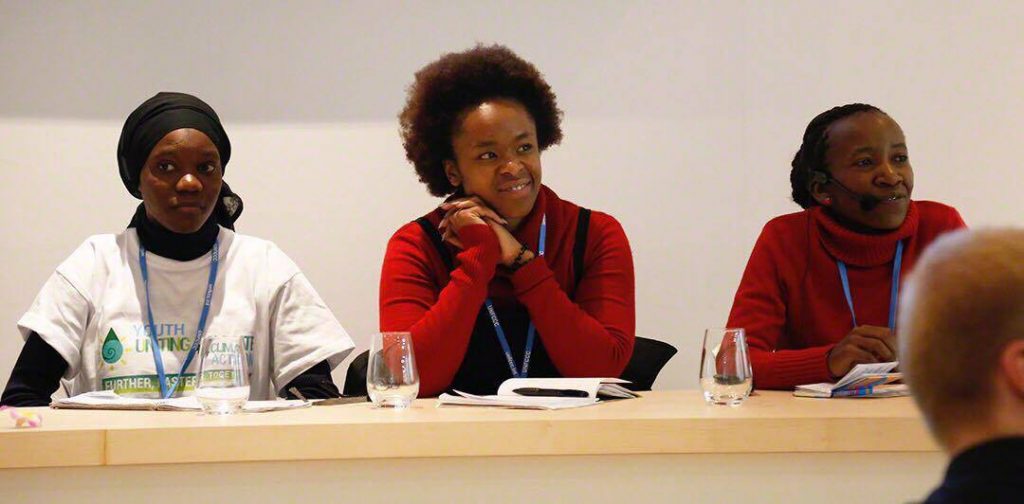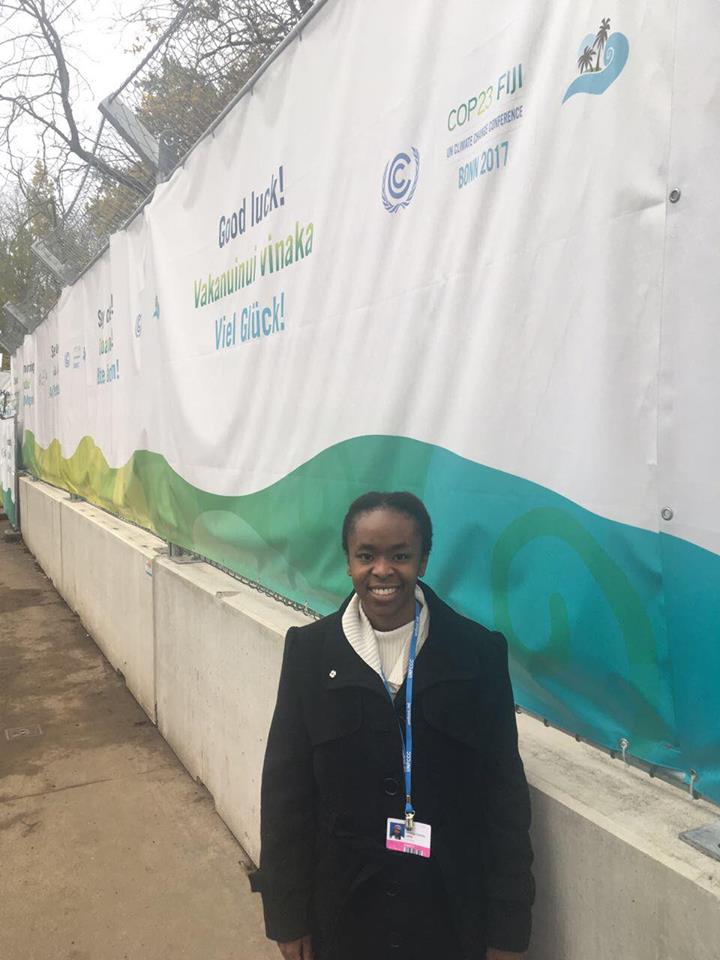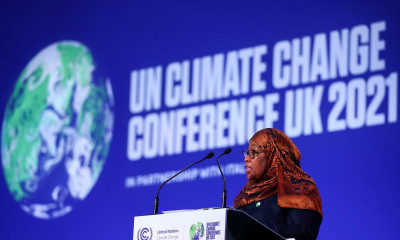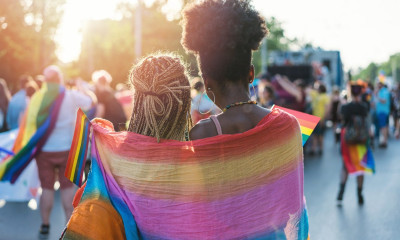In the run-up to the conference, our Youth Policy Committee and the South African Youth Climate Change Coalition drafted the country’s official youth position on COP 23. Read the full statement.
Blog 8 – Education Day
The Bonn zone was buzzing with observers, negotiators and ministers attending various side events today. Week two of COP is known as the week of high-level engagements, where dignitaries from all over the world attend the conference to put forward country positions and enhance partnerships for global climate action.
As it was Education Day today, many of the side events were about climate education, which received much attention from the youth. I attended a side event with the South African Deputy Minister of Environmental Affairs, Ms Barbara Thomson, on Innovative Approaches to Climate Change Education and Youth Empowerment for Climate Action. Some of the panellists included representatives from eco-schools in Morocco, Danae Espinoza from the Education, Communication and Outreach Stakeholders Community (ECOS) and Timothy Damon, founder of the Global Youth Development Institute.
While a lot of ideas were shared regarding climate education, the prominent themes were the need for climate literacy to prepare youth for green jobs in the future and investment in youth to enable our projects and goals to materialise. Thomson added there was a need to look into how indigenous knowledge could be used for climate action, reducing carbon emissions and conservation.
A major concern, in the context of Africa, is having enough educators. UNICEF’s Generation 2030 Africa 2.0 report predicted that we will need 5.8 million primary school educators by 2030 to cater for the emerging youth demographic. But because of low salaries, careers in education are becoming less popular. This makes introducing climate literacy as means to build a climate-resilient future for Africa very difficult, however, it must be done. We need to learn from the Moroccans, who have around 1,600 eco schools, so that we can be global competitors in this emerging green economy.
The South African Minister of Environmental Affairs Dr Edna Molewa stressed the need for pre-2020 action when she gave her speech at the high-level segment. We desperately need to change our daily behaviour and enhance our climate literacy for a climate-resilient Africa.
Blog 7 – Africa Day
Today we celebrated Africa Day at COP: a joint initiative of the African Development Bank (AfDB), the African Union Commission (AUC), the United Nations Economic Commission for Africa (ECA) and the New Partnership for Africa’s Development (NEPAD).
With COP23’s theme being Partnerships to Implement the Paris Agreement: Africa’s Response, this was a fitting gesture.
The focus of the day was to have discussions related to funding, capacity-building, development and technology transfer in Africa. The excitement of the high-level segment seemed to overshadow the significance of the Africa Day celebration. Nonetheless, the President of the Pan-African Parliament Roger Nkodo Dang met with the African youth. At this meeting, President Nkodo Dang encouraged us to continue participating in COP meetings and reminded us to pass on what we have learned at the conference to our respective countries and communities. “I have been present at all COPs since the every first one in Berlin and only after 21 years did we reach an agreement,” he said. He ended off his address by challenging us to do better than his generation had done regarding climate issues.
After meeting with President Nkodo Dang, we, as African youth, decided to have another meeting to attempt to establish an African Youth Network to feed into the annual African Conference of Youth on Climate Change. I was disappointed about the outcome of this meeting. We did not resolve the issue of how we, as young Africans, position ourselves at COP, neither did we discuss our mandate. This was mainly due to the challenges we discussed, linked to finances and a shortage of resources. However, we are eager to resolve these and come up with solutions before the end of COP23 to leave something concrete for the African youth group who will attend COP24. Our aim is to continue to collaborate and act on climate change. We are driven and encouraged to do better!
Blog 6 – Deadlock
The mood around COP today was very ambivalent. Whilst many celebrated the victories of successfully closing negotiations with adopted draft decisions in time to close the Subsidiary Body for Implementation (SBI) today, other negotiations groups such as the Ad Hoc Working Group on the Paris Agreement (APA), Finance and Mitigation hit a deadlock as no amicable solution was reached.
The main reason why these agenda items were not successfully closed was due to the issue of differentiation. While developed countries prefer the one-size-fits-all approach, developing countries acknowledge the fact that the needs of all countries are not the same.
Another issue hindering progress is the issue of support and the need for resources. Developed countries want limited liability when it comes to assisting developing countries with resources, which is very problematic. The matters have now been elevated to the ministerial level as this deadlock is more political than technical. I, personally, am looking forward to the high-level segment to see how ministers engage with these issues to ensure pre-2020 ambition, which seems to be losing momentum.
Blog 5 – We’re the drivers of change
After a highly contentious negotiation process, the draft decisions on capacity-building for developing countries was finally finalised and adopted by parties in a Subsidiary Body for Implementation (SBI) meeting.
The United Nations Framework Convention on Climate Change (UNFCCC) established a Paris Committee on Capacity Building (PCCB) which is set “to address gaps and needs, both current and emerging, in implementing capacity-building in developing country Parties and further enhance capacity-building efforts, including with regard to coherence and coordination in capacity-building activities under the Convention”.
The past few days have been fruitful for capacity-building negotiators because after long and tiring talks they managed to produce draft decisions which will help countries realise their nationally determined contributions. The UNFCCC’s youth constituency managed to get the term ‘youth’ included in the draft text in a paragraph relating to the PCCB collaborating with other bodies to enhance climate action efforts.
Action for Climate Empowerment (ACE) focuses on six action areas on climate change: education; training; public awareness; public participation; access to information and international cooperation. I managed to participate in a meeting where the draft decision on ACE was formulated. Within the UNFCCC’s youth constituency, ACE was discussed as the core element of the Paris Agreement. ACE should be a priority area for youth empowerment and participation in the negotiations.
Having experienced the negotiations on capacity building and ACE, I have come to understand and appreciate the process of putting forward decisions on specific climate-related areas. Furthermore, an ongoing critical reflection for me is the vital role that young people play in climate action and implementing the Paris Agreement. Youth need to be involved and empowered because they are drivers of change in society.
The hard work does not end here. In the coming days we will hear the positions of various heads of state, government representatives and other dignitaries. I am looking forward to our Minister of Environmental Affairs Ms Edna Molewa’s speech on South Africa’s position and progress on climate action, which will take place on Thursday 16 November.
Another event I am excited about is the high-level youth briefing that UN Secretary-General António Guterres will hold today, Wednesday 15 November. Here, young people will have an opportunity to engage with the decision-makers within the Convention and finally be heard! The doors are opening, but are we ready to engage meaningfully?
Blog 4 – Thinking big
Today was about capacity-building and climate finance, two hot topics in the negotiations that require robust engagement in order to implement the Paris Agreement.
My day kicked off with a meeting I organised with Mr Zaheer Fakir, who I see as the guru of climate finance in South Africa.
Mr Fakir is Chief Adviser of International Relations and Governance at the South African Department of Environmental Affairs. He also serves as the South African focal point for the Global Environment Facility (GEF) , he is a member of the Kyoto Protocol’s Adaptation Fund (AF), a board member of the World Bank’s Clean Technology Fund and the Green Climate Fund (GCF).
In the spirit of Mandela Day; Mr Fakir devoted 67 minutes of his day to answering questions and giving advice on the various funds under the UN Framework Convention on Climate Change. During this session, he went through the technical processes and modalities surrounding the funds that aid climate projects and assist member parties in transitioning to become low-carbon emitters.
He acknowledged the concern regarding accessibility of funds and explained that the projects funded are often high risk and can lead to low returns on investment. He also talked about a solution for funding smaller, practical projects. From my discussion with Mr Fakir, I gathered that the funding initiatives all have one vision: to support developing and vulnerable nations in up-scaling their resilience to climate change.
Closely linked to the concept of climate finance is the need for countries to grow their capacity to mitigate and adapt to climate change. Today I also attended a Subsidiary Body for Implementation (SBI) meeting on capacity-building. The implementation of the Paris Agreement requires strategic efforts with a dedicated focus on capacity-building as many developing nations lack the capacity to implement climate action. This meeting was about increasing the coordination and monitoring of existing capacity-building initiatives to achieve the Paris Agreement ambitions. A crucial element for driving capacity-building initiatives is climate finance.
Mr Fakir and I talked about the lack of funds set aside for African youth or vulnerable groups of people to participate in future COPs. He said with the right innovation and creativity, young people could come up with ideas for viable projects that could be considered for funding through the available funding streams. While smaller youth projects exist at a national level, they don’t meet the requirements to receive funding.
I found the Q&A session with Mr Fakir and SBI meeting on capacity-building highly insightful and eye-opening. They inspired me to think about capacity-building in Africa through a youth lens and what climate finance means for young people who are interested in mobilising climate action. To be recipients of these funds, we need to challenge ourselves to think big about projects that could significantly impact the communities in which we live.
More than that, we need to challenge ourselves to be innovative, explore new sustainable technology and equip people with the necessary skills and tools to best create projects to adapt, mitigate or ensure resilience in developing countries. While policy is important, it is time to focus more of our energy on implementation. I am excited to see how the allocation of funds are specifically targeted towards capacity-building as the conference progresses. I am also interested to see if any of those funds will be directed towards developing the capacity of young people in developing countries.
Blog 3 – Celebrating youth
Today was Youth and Future Generations day at COP! This day has been the busiest and most exciting so far. The UN Framework Convention on Climate Change describes this day as “a non-stop celebration of youth power and participation”. My day began with a dynamic opening ceremony led by young people. A central theme of this session was on the progress made to include more children and youth in the COP process and climate change action.
Whilst this was an interesting discussion, I was greatly concerned because the panellists did not reflect the diversity of youth globally. The panellists were all youth from the Global North, with one exception being from Samoa, a Small Island Developing State.
The day progressed with various actions performed by youth with the intention of raising awareness about intergenerational inquiry, which relates to the importance of meaningful youth participation in climate-related matters.
The highlight was a side event Youth@SAIIA planned and hosted with WWF in Africa in the WWF Pavilion. The theme of the event was “Harnessing the emerging youth demographic to create a climate resilient future”, and was linked to the recently launched UNICEF Generation 2030 2.0 report.
From 25-26 October, I joined other outstanding young people from across Africa to discuss this new report which highlights the needs of the growing youth demographic in Africa. I assisted in putting together a youth statement for the global release of the report in Johannesburg, and as we prioritised climate change as a key area for consideration, I was excited to take this message to COP23.
During today’s panel at the side event, I spoke about the emerging youth demographic and how child and youth participation is vital to ensure a climate resilient future for Africa. Fatou Jeng from the Gambia added to the discussion by speaking about the effects of climate change on agriculture and biodiversity in her country. She further reiterated that youth participation is key and that there is a need for African youth to be given a seat at the decision-making table.
Maureen Sigauke from Zimbabwe spoke about her experience with youth engagement in policy-making in Zimbabwe, noting that there are challenges around African youth mobilisation and financing projects. She urged African youth to collaborate with each other and start finding out what they are passionate about and pursuing that.
Katia Rakotonirina from Madagascar ended by sharing information about some projects in her country, such as a national climate change conference. She noted challenges of a lack of interest among youth, the dire need for capacity-building and lack of coordination among young people.
What I appreciated about this panel discussion is that the audience also shared their experiences from their respective countries and organisations. Additionally, the President of COP20, Peruvian Minister of the Environment Manuel Pulgar-Vidal, addressed the audience at the end, and acknowledged the need for youth participation, urging youth to continue engaging and volunteering their services to organisations to make a difference.
My Youth and Future Generations Day ended on a high note: I am glad I was able to participate in the side event and I am thankful to all who helped make the event a great success.
Read the coverage on this event.
Blog 2 – A seat at the big table
It was a cold morning in Bonn as day two of the conference kicked off. A key reflection from today was the fact that I am attending the conference as a member of a party delegation. COP events function according to a badge system for each delegate, these badges dictate your access to certain meetings and events.
As a member of the South African party delegation, I was given a pink badge. Last year, I attended COP22 as an observer and I was given a yellow badge. With a pink badge I’ll be able to play a far more involved role in the meetings ahead!
This year I am experiencing the heart of COP; the party negotiations in their raw and complex form.
Engaging with the negotiators has shown me just how taxing being a party representative is. The negotiators are doing their best to convey the concerns of climate change-affected communities they represent, and ensure their issues are addressed. My main goal is to draw the negotiators’ interest to our actions and declarations as a youth delegate. Experiencing COP like this has changed my perceptions entirely.
While I appreciate my party badge privilege, I still wonder if it’s enough. Is being the only youth delegate from South Africa enough to raise the ambition of the Paris Agreement? Moreover, given that there is a lack of African youth present at COP23, how do we create a climate resilient future for Africa without them being here? I also wonder if the negotiators will notice this and include more young Africans in future COPs so they too can take up the position I am privileged to be in today.
Blog 1 – Arriving in Bonn, Germany
The excitement of the 23rd United Nations Framework Convention on Climate Change (UNFCCC), Conference of the Parties (COP23) in Bonn, Germany could be felt as soon as I hopped off the plane.
The airport was filled with welcome posters transcending all the way into the buzzing streets of Bonn. I could personally feel a sense of optimism, which brought about the anticipation that this COP would be different from previous ones.
The fact that Fiji, a member of the Small Island Developing States (SIDS) was granted presidency, gives this COP a different perspec
tive regarding the overall outcomes of these negotiations. This is due to the fact that Fiji and other SIDS have already started to experience the brunt of climate change through incidents of rising sea water levels and flooding. A critical question to anticipate in this light; is how will SIDS be prioritised at this COP?
Given the decision of US president Trump to withdraw from the Paris Agreement, one of the primary concerns expressed by the delegates is the position of the US at this COP. Important to note, however, is that nations are adamant to not be deterred by the agenda of the US. The significance of having COP a few feet away from the UN campus, in a country invested in climate action and reducing greenhouse gas emissions, could not make negotiating for the implementation of the Paris Agreement any more suitable. Through conversing with people from Germany, many expressed their excitement and concerns about the proceedings of COP 23.
Given the new political situation in Germany post the elections, many citizens are left wondering who is going to represent
them at these negotiations and what they will be advocating for. The Greens are adamant on closing down the coal-fired power stations that exist, however the more conservative bloc wants to keep them running. Many protests have been seen at the power stations from citizens in the nearby villages requesting that they are shut down.
The opening plenary of COP addressed the need to increase ambition, focus on the implementation of the Paris Agreement and the urgency to reduce greenhouse gas emissions. UNFCCC Executive Secretary Patricia Espinosa stated that she is expecting the COP to create “higher awareness and a sense of urgency” for
those suffering from climate impacts. My key reflection from the plenary is that the need to raise ambition is ever more present. The German Minister of Environment Barbra Hendricks announced that Germany is committing EUR 50 million towards climate change adaptation.
With countries taking responsibility and committing to do more, I am excited to see how the rest of the negotiations will go and most importantly, what new insights and actions will be taken to ratchet up progress on the Paris Agreement.

